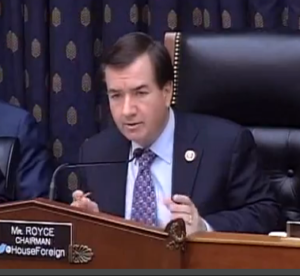BBG Watch Media

In an interview with The Washington Times, Chairman of the House Foreign Affairs Committee, Rep. Ed Royce (R-CA), said that the Broadcasting Board of Governors is not countering Kremlin propaganda effectively and is “essentially broken.”
Rep. Royce and House Foreign Affairs Committee Ranking Member, Rep. Eliot Engel, are co-authors of the H.R. 2323 bill, the United States International Communications Reform Act “to improve the missions, objectives, and effectiveness of U.S. international broadcasters.”
Rep. Engel “suggested that the Broadcasting Board of Governors has failed to engage in strategies to penetrate its content into the world’s evolving media space,” The Washington Times reported.
“’It’s remarkable to see the sophisticated media offense that Putin is conducting across Eastern Europe, Central Europe, the Middle East and Latin America through Russia Today,’ said Rep. Edward R. Royce, California Republican and chairman of the House Foreign Affairs Committee.
‘We’re just not countering it effectively,’ Mr. Royce told The Washington Times, asserting that the federal Broadcasting Board of Governors, which oversees RFE/RL, VOA and a slate of other taxpayer-funded international news outlets, is essentially broken.”
The Washington Times reporter Guy Taylor noted that “Broadcasting Board of Governors Chairman Jeff Shell testified to the Senate Foreign Relations Committee last month that the organization is pursuing internal reforms, including institutionalizing the position and power of the board’s CEO.”
CEO John Lansing went further, “asserting that the Royce-Engel proposal would add a layer of bureaucracy that could challenge the integrity of the various news organizations beneath the Broadcasting Board of Governors while making it more difficult for them to streamline toward a single, potent mission focus.”
Mr. Lansing and Mr. Shell strongly oppose the key reform provision of the bipartisan H.R. 2323 bill. While they are highly successful cable, TV and film entertainment private sector executives, neither has any substantive experience in government operations, U.S. international news media outreach, U.S. public diplomacy or foreign policy.
The Washington Times reported that according to Mr. Lansing the bill would “degrade them [U.S. international media activities] into media entities that are competing rather than cooperating, would limit their access to U.S. foreign policy goals, and would severely inhibit the ability for the U.S. to present a coherent strategic alternative to foreign propaganda.”
The most successful period in the history of U.S. international broadcasting was during the Cold War when the Voice of America and the surrogate broadcasters operated fully independently of each other and pursued different missions. The decline of U.S. international broadcasting started under the Broadcasting Board of Governors when media outlets were combined into one umbrella organization in 1999. Mr. Shell and Mr. Lansing argue for even more centralized control.
Many critics, including former Washington Post foreign correspondent in Moscow, former NPR president and former Radio Free Europe / Radio Liberty (RFE/RL) executive Kevin Klose, as well as many former BBG members and former high-level U.S. diplomats and public diplomacy experts, disagree with Mr. Shell and Mr. Lansing.
Critics, including former Secretary of State and former BBG member Hillary Clinton claim that the BBG is “practically defunct.” They are convinced that increasing bureaucratic control and centralization under one BBG board and one CEO, as Mr. Shell and Mr. Lansing propose, would make even the current bad situation much worse. Supporters of H.R. 2323 say that the bill offers structural reforms that would strengthen and preserve the effectiveness of both the Voice of America and the surrogate media outlets such as RFE/RL and Radio Free Asia (RFA).
READ MORE: Russia propaganda machine gains on U.S. – American lawmakers push bill to counter Putin message, By By Guy Taylor – The Washington Times – Sunday, December 27, 2015
The following comment was posted under The Washington Times article by former Voice of America senior White House correspondent, former correspondent and language service manager Dan Robinson:
DAN ROBINSON: This is all such a continuing joke — but not so funny for the American taxpayer.
BBG-run organizations such as VOA make a lot of noise about being
seen as independent journalistic entities. In the case of VOA, it has journalists
who openly protest being part of any effort to counter anything.
Yet, they are most certainly NOT independent but government-funded, with a mission.
You have a board made up of key ideological and foreign policy influencers (some running
think tanks, and former ambassadors) pandering to all sides, rushing to ensure Congress and
the administration that the BBG has everything under control. . . which of course, means insisting
on changes and additions to programs and news coverage that only underscore precisely that
the entities they control are not independent.
By merely saying that his muddled agency is a “coherent strategic alternative to foreign propaganda”,
Lansing and anyone else who occupies the CEO position, acknowledge what everyone knows — that
the place has an agenda. That’s the case now, and it has been for decades since U.S. international
broadcasting began. Yes, the existence of the firewall is fact, but it certainly has not prevented the
use of all of these entities as “tools” in the foreign policy and national security agenda.
As this article accurately portrays, BBG effectiveness is seriously in doubt, despite
the ‘inflate the numbers’ game played by the board, its subsidiary IBB, and their research
office. The latest aspect of that game is for the BBG and IBB to boast about their higher numbers
in . . . wait for it. . . . MEXICO.
Royce and Engel are not fools. But they have been embarrassed by the ability of the
slick information peddlers at BBG and IBB to persuade a few powerful people on the
Hill to just give this sick agency more time. They have been played, big time, and the reform
legislation has stalled.
And that has indeed given the highly-paid but often inefficient and incompetent bureaucrats
pulling in their SES salaries another chance.
